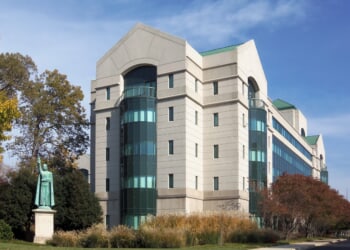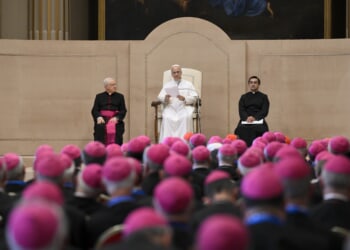Dr Sarah Ingham is the author of The Military Covenant: its impact on civil-military relations in Britain.
First Lord of the Treasury, Minister for the Civil Service, Prime Minister of the United Kingdom, bane of Britain. Is the main job of the Prime Minister to be the effigy burnt on Bonfire Night?
Last week, in awe-inspiring, looking-good-as-13th-Century-new Salisbury Cathedral, John Major gave the annual Edward Heath lecture. Sir John acknowledged his predecessor-but-one could be prickly, but:
“He wasn’t born to privilege but rose to prominence by sheer ability … His priority was country first, Party second. And he led, not followed, public opinion.”
Arundells, Heath’s beautiful house in Salisbury’s Cathedral Close, gives an insight into his life outside politics. A world-class yachtsman (Sydney-Hobart race winner), a gifted musician, and a collector of excellent art, he had what his Labour contemporary Denis Healey called “hinterland”. Both had another qualification for success in their political era – a so-called good war.
Major has no doubt “the discerning eye of history will treat him more generously than his contemporaries.” The same, surely, can be said of Sir John himself.
His speech (‘The Changing Political Landscape at Home and Abroad: A Reality Check‘) not only gave the audience a tour of the troubled international scene, warning nations not to retreat into “little trenches” of self-interest but reflected on politics as a moral cause. “Politics is about people, their hopes, their fears, their lives – it is not just about deals or money or mineral wealth.”
Today the Conservative Party’s elder statesman, while in office Major had to endure almost constant carping. After an unexpected general election win in April 1992, he never seemed to catch a break after Black Wednesday that September. The Sun’s legendary editor Kelvin Mackenzie told him how the tabloid would cover that day of financial turbulence: “I’ve got a bucket of shit on my desk, Prime Minister, and I’m going to pour it all over you.” It summed up the media’s approach until 1997.
Almost 30 years on and eight premiers later – five of them Conservative – few, if any, have improved significantly on Major’s record in Number 10. Britain was far more at ease with itself in the 1990s than it is today, the economy in better shape, the public realm safer and less down-at-heel.
As he observed last week, Britain is now at a low ebb: “Our military capacity has fallen steadily… Our great institutions ‒ Parliament, politics, the Church, Police, press, public services – no longer have the respect they once enjoyed.” Britain could be back, but by looking ahead, not by politicians “channelling their inner Attlee or inner Thatcher” – and by having better trading relations with Europe.
Unlike Starmer, Major is a politician. He did grunt work as a local councillor, then an unpaid task as well as largely thankless one. His House of Commons majority became wafer-thin, with too many MPs increasingly self-serving. It is testament to his political skills that he lasted seven years.
A year ago today, Labour gained a 174-seat majority. Far from relishing the job, Starmer cannot wait to board a private jet, leave the country and tread the red carpet. He should be a Kardashian. Constantly banging on about “working people”, he can’t bring himself to sit among them in Arsenal’s Emirates’ Stadium – unlike Rishi Sunak at Southampton, or Nigel Farage anywhere.
Aloof from the general public, the humourless premier is completely out-of-touch with their mood. The Lord Alli freebies furore seems unfathomable to him, not least because he “followed the rules”. This a lawyer’s answer, not a politician’s; Starmer might have been Director of Public Prosecutions, but he’s a political dud.
The Prime Minister “increasingly resembles a terrified, bespectacled supply teacher who’s lost control of a class of 12-year-old girls.” This, of course, can only come from Boris Johnson, rivalling Farage for the crown of the most charismatic of Britain’s 21st-century politicians. Great campaigner, chief cheerer-upper… and absolutely the wrong leader to guide the country through a pandemic.
(Major suggested that ‘Brexit’ might yet be “written on the tomb of the Conservative Party.” Perhaps. Given that the polls have never recovered from late 2021 with reports about high jinks in Number 10, it might be ‘Lockdown’.)
David Runciman’s Past Present Future podcast recently explored the history of charisma and how it can cloud assessments of political leaders.
Devoid of charisma, political competence or the common touch – not unlike Sir Keir – Liz Truss should never have got near the Conservative leadership. It was a travesty to replace the Johnson regime with someone who was poison on the doorstep, as any canvasser can testify. What was the Party thinking?
More importantly, is the Party learning? The seven-week Dud Assoluta debacle demands an urgent re-assessment of the leadership contest rules.
Differentiation should be made between government and opposition. The membership should pick a shortlist of candidates (encouraging hopefuls to work hard) but MPs have the final say. After a general election defeat, the leader should stay on for a while. (This is no criticism of Kemi Badenoch, but to let the dust settle.)
Politics is brutal. As voters, we dislike our leaders when in office. And why shouldn’t we? They want to boss us around and take our money. A few can earn our grudging respect.
Thanks to their labyrinthine rules, the Labour Party is lumbered with a liability of a leader. Ideally, one would never pick a dud; but should one, then dumping them in 49 days is a virtue. Let’s remember the motto of the world’s most successful industry, tech: “Fail fast”.









![Florida Man With Violent History Arrested for Choking a Cop [WATCH]](https://www.right2024.com/wp-content/uploads/2025/06/Eleven-Stabbed-in-Attack-at-Salem-Homeless-Shelter-Across-From-350x250.jpg)






